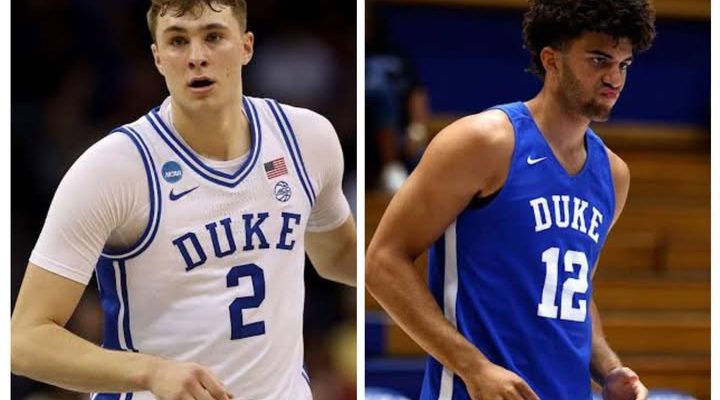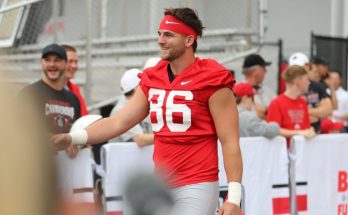# **Cooper Flagg vs. Cameron Boozer, Frontcourt Rotation & the Future of Duke Basketball**
Duke basketball is no stranger to elite talent, and the program’s frontcourt is once again at the center of attention following Cooper Flagg’s electrifying freshman season and subsequent departure to the NBA. With Flagg’s exit, all eyes now turn to Cameron Boozer—the next potential superstar in Durham—and how the Blue Devils will reconstruct their frontcourt rotation.
Fans have flooded message boards and mailbags with questions: Can Boozer immediately fill Flagg’s shoes? How will Jon Scheyer manage minutes and roles in the frontcourt? And what does this mean for Duke’s championship aspirations in the coming seasons?
## **Cooper Flagg’s Legacy and the Void He Leaves Behind**
Cooper Flagg’s lone season at Duke was nothing short of spectacular. The 6’9″ forward was a two-way force, averaging 18.5 points, 9.2 rebounds, 3.4 assists, and an eye-popping 2.8 blocks per game. His defensive instincts, versatility, and basketball IQ made him one of the most impactful freshmen in recent memory. Flagg’s ability to guard multiple positions, stretch the floor, and dominate in transition was instrumental in Duke’s deep tournament run.
Now that he’s off to the NBA (where he’s projected as a top-two pick), the Blue Devils must find a way to replace his production. While no single player can fully replicate what Flagg brought, Duke’s next wave of talent—led by Cameron Boozer—has the potential to keep the program among the nation’s elite.
## **Cameron Boozer: The Next in Line?**
Cameron Boozer, the son of former Duke star and NBA veteran Carlos Boozer, arrives in Durham as one of the most polished high school prospects in recent years. Standing at 6’9″ with a refined offensive game, Boozer has drawn comparisons to his father but with a modern twist—he can shoot from deep, handle the ball like a guard, and finish with either hand around the rim.
Unlike Flagg, who was a defensive disruptor from day one, Boozer’s strengths lie in his scoring versatility and basketball IQ. He doesn’t have Flagg’s otherworldly defensive instincts, but he’s an efficient scorer who can operate in the post, mid-range, and beyond the arc. The question is whether he can immediately step into a leading role and help Duke maintain its status as a national contender.
## **Frontcourt Rotation: Who Steps Up?**
Beyond Boozer, Duke’s frontcourt will feature a mix of returning players and incoming recruits. Here’s how the rotation could shake out:
### **1. Cameron Boozer (PF/C)**
– **Role:** Primary scorer and offensive focal point
– **Strengths:** Elite scoring touch, high basketball IQ, rebounding
– **Questions:** Can he anchor the defense? Will he adjust to the physicality of college basketball?
### **2. Khaman Maluach (C)**
– The 7’1″ freshman from South Africa is a defensive anchor with shot-blocking prowess.
– If he develops offensively, he could be a dominant force in the paint.
### **3. Sean Stewart (PF)**
– After a promising freshman year, Stewart’s athleticism and energy could earn him major minutes.
– Needs to improve his offensive consistency to be a full-time starter.
### **4. Isaiah Evans (SF/PF)**
– A versatile wing who can stretch the floor and defend multiple positions.
– Could play small-ball 4 in certain lineups.
### **5. Darren Harris (SF/PF)**
– A sharpshooting forward who provides floor spacing.
– Likely a rotational piece rather than a starter.
Jon Scheyer will have options, but the key will be finding the right balance between offense and defense. Boozer and Maluach could form a formidable inside-out duo, while Stewart’s energy off the bench could be invaluable.
## **The Future of Duke Basketball**
Losing a generational talent like Flagg is never easy, but Duke’s ability to reload with elite recruits ensures they remain in the championship conversation. Boozer has the pedigree and skill to be a star, but his success will depend on how quickly he adapts to the college game and whether the supporting cast steps up.
The 2024-25 season will be a test of Scheyer’s coaching acumen. Can he maximize this roster’s potential? Will Duke’s frontcourt be strong enough to compete with the likes of Kansas, UConn, and Kentucky?
One thing is certain: Duke basketball isn’t going anywhere. The program’s ability to attract top-tier talent ensures that even after losing a player like Flagg, the next wave of stars is ready to take the torch.
## **Final Thoughts**
Cooper Flagg’s departure leaves a massive void, but Cameron Boozer’s arrival gives Duke fans plenty of reasons for optimism. The frontcourt rotation will be a storyline to watch, with Boozer, Maluach, and Stewart all vying for key roles.
If everything clicks, Duke could once again be cutting down the nets in April. If not, growing pains may be inevitable. Either way, the future of Duke basketball remains bright—and the next chapter promises to be thrilling.



